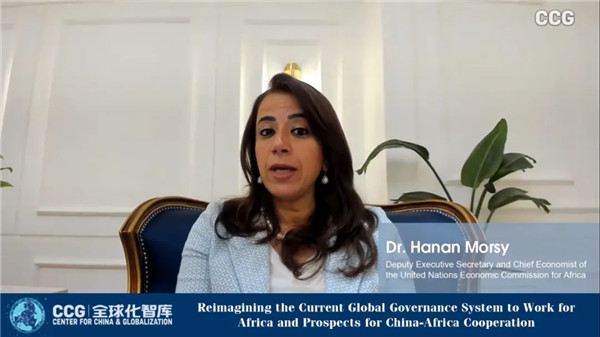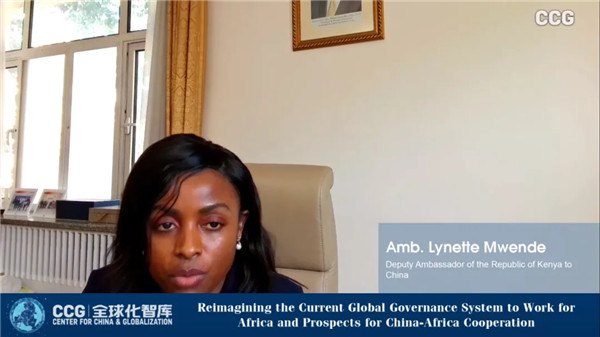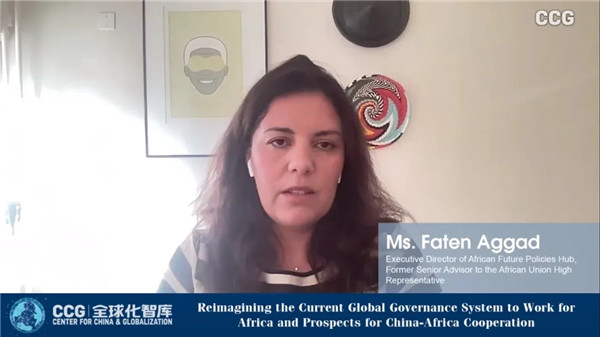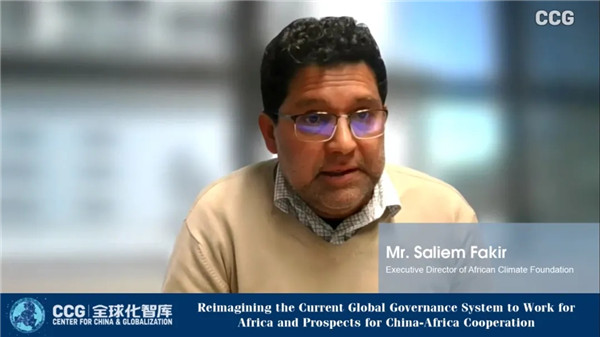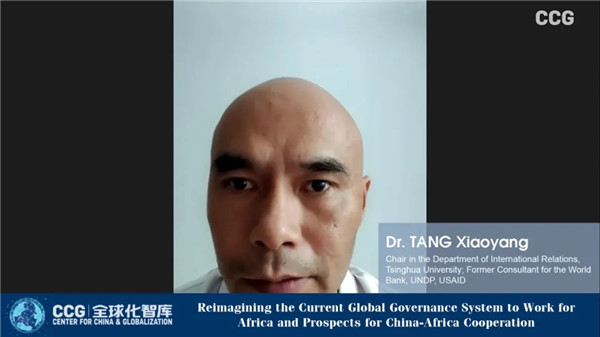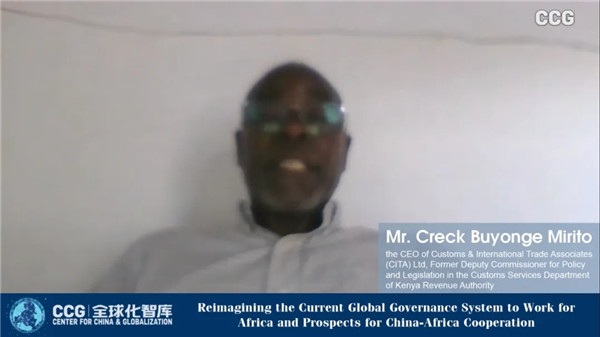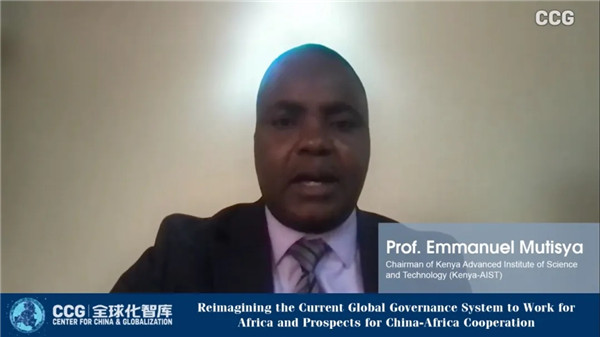CCG seminar on global governance and the future of China and Africa
September 02 , 2024▲Video(English)
▲Video(Chinese)
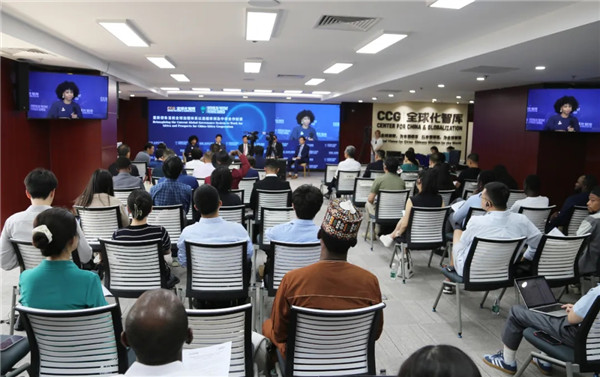
On 29 August 2024, on the eve of the opening of the 9th Forum on China-Africa Cooperation (FOCAC), the Center for China and Globalization (CCG) and Development Reimagined jointly organised a seminar on ‘Reimagining the Current Global Governance System to Work for Africa and Prospects for China-Africa Cooperation’. Diplomats, heads of international organisations, think tank experts, university scholars and nearly 20 media professionals from China and African countries gathered to discuss how China-Africa cooperation can play a greater role in global governance.
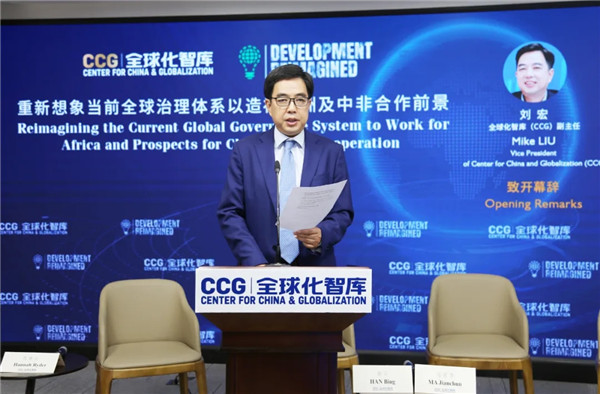
In the opening session, Mr. Mike LIU, Vice President of CCG, delivered a speech to kick off the event. Liu Mike firstly expressed his sincere welcome to all the participating guests on behalf of Henry Huiyao Wang, President of CCG, and Mabel Lu Miao, Secretary-General of CCG, who are currently visiting Europe. In his speech, he pointed out that China is the largest developing country in the world, and Africa is the continent with the largest concentration of developing countries in the world, and the cooperation between the two sides is of great and far-reaching significance. Over the past few years, China and Africa have cooperated on many projects in many fields such as poverty alleviation, agricultural development, infrastructure construction, etc. Many infrastructure projects including the Nigerian Railway have been completed and put into operation. At the same time, China has dispatched more than 2,700 experts in agricultural technology to many African countries to realise the sharing of knowledge further. It is foreseeable that the future cooperation between China and the African continent will be even more colourful and diversified. As China’s leading international think tank, CCG is honoured to host this event and looks forward to contributing to the strengthening of the partnership between China and Africa through people-to-people exchanges and interactions.
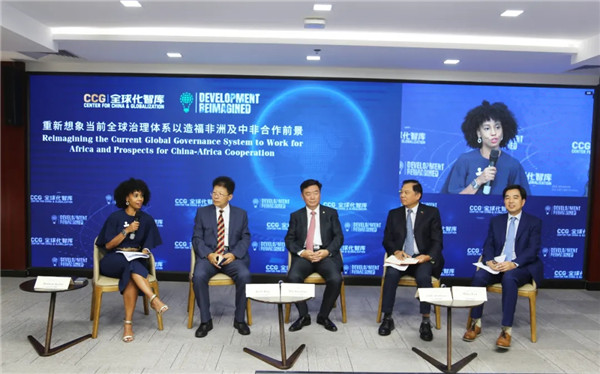
Afterwards, Ms. Hannah Ryder, CEO of Development Reimagined, moderated a high-profile panel discussion. More than 10 diplomats, heads of international organisations, think tank experts and university scholars from China and African countries joined together to have in-depth exchanges on topics such as the current reform of the global governance system, and the prospects of China-Africa cooperation.
Dr. Hanan Morsy, Deputy Executive Secretary and Chief Economist of the United Nations Economic Commission for Africa, believes that there are three important pillars as far as African finance is concerned. First, in terms of infrastructure, there is a need to put forward better development ideas and plans, and formulate feasible countermeasures to meet the global sustainable development goals while realising the development goals of African countries; second, there is a need to build an effective and functional institutional system, such as the G20 as a basic framework, to facilitate the flow of more resources; and third, the representativeness of African countries is crucial, and efforts should be made to promote a healthy system of governance in African countries. Thirdly, the representation of African countries is crucial, and efforts should be made to promote a healthy system of governance in African countries.
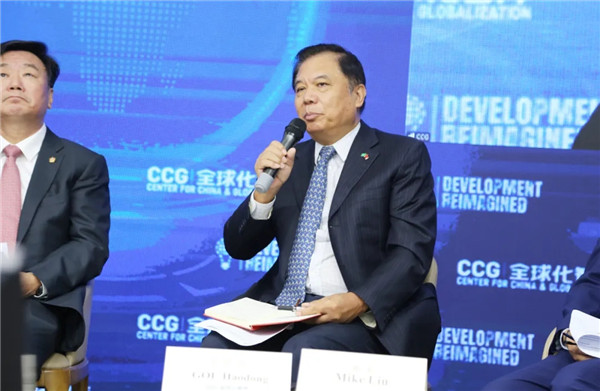
Mr. GOU Haodong, Former Deputy Representative of the Chinese Mission to the African Union, CCG Senior Research Fellow, pointed out that compared with China-Africa economic and trade co-operation and political relations, the two sides are lagging in the development of humanistic exchanges and public diplomacy. Africa is an extremely rich and colourful continent with splendid civilisations and colourful cultures. However, the public in China does not know much about it. Similarly, young Africans’ knowledge of China is still limited to Bruce Lee and Jackie Chan films, and they know very little about many aspects of China today. In the future, this should be attached great importance, which has a bearing on the degree of knowledge and goodwill of the Chinese and African people towards each other. It is believed that based on mutual understanding, the increase in goodwill will bring strong impetus to China-Africa co-operation and the development of relations at all levels.
Amb. Lynette Mwende, Deputy Ambassador of the Republic of Kenya to China, first expressed her gratitude to CCG for organising this meeting and inviting various sectors for discussion. She mentioned that in recent years, Kenya has issued a series of policies by the president, aiming at promoting financing efforts to better advance global climate and other global issues. She hopes the international community can pay more attention to the voice of the African continent, especially in the reform of the international financial architecture. She pointed out that key sectors in Africa, such as industry and agriculture, are vulnerable to climate change and urgently need institutional and systemic reforms to build a more structured financial system. She said the global community can cooperate based on common goals to establish an inclusive global governance system that promotes the development of all countries, leaving no country behind. Finally, she emphasised that Africa should be seen as part of the solution in the global reform process and expressed her expectation to strengthen cooperation with China to jointly promote the development of the global system.
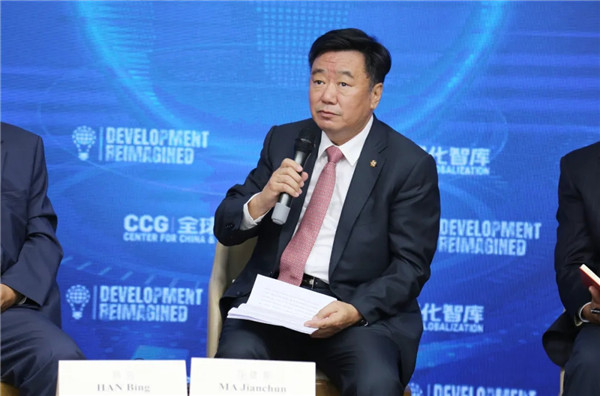
Mr. MA Jianchun, Former Director-General of the Department of Foreign Affairs, the Ministry of Commerce and Former Ambassador to the Chinese Embassy in Gambia, pointed out that African countries currently have very limited voice and influence in the international financial system. He called on the international community to increase support for African nations and suggested that African countries explore new financial pathways through the BRICS cooperation framework, utilising South-South cooperation to provide financial mechanisms and solutions. Ma Jianchun emphasised that economic development is the top priority for African countries and the core focus of China-Africa cooperation. He called on all parties to deepen collaboration to elevate the status of African countries on the international stage and expressed his hope that the upcoming Forum on China-Africa Cooperation (FOCAC) will set the direction for China-Africa cooperation in the coming years.
Ms. Faten Aggad, Executive Director of African Future Policies Hub, and Former Senior Adviser to the African Union High Representative emphasised the importance of the 9th Forum on China-Africa Cooperation (FOCAC) and called on China and Africa to speak freely and promote closer cooperation, especially on international platforms such as the G20 Summit. She pointed out that multilateralism is crucial for African countries and requires the support and participation of all parties. She also highlighted the necessity of United Nations Security Council reform, urging for increased representation of African countries in the Security Council and the international financial structure. Additionally, she advocated for the use of diversified financing tools to more efficiently utilise and share resources, while reminding stakeholders to consider regional differences in African financing plans to ensure that different market levels receive appropriate support.
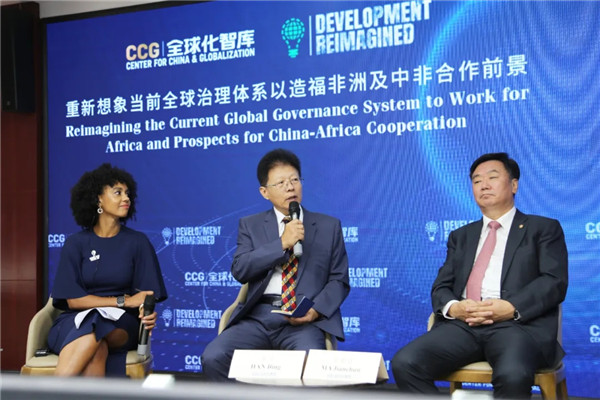
Mr. HAN Bing, former Minister Commercial Counselor in the Embassy of Egypt and former Economic and Commercial Counselor in the Embassies of Zimbabwe, in his speech highlighted the key role played by the Forum on China-Africa Cooperation (FOCAC) in elevating Africa’s international status, noting that this model of cooperation not only facilitated deepening of China-Africa relations, but also triggered the establishment of governmental dialogue mechanisms between other countries and Africa. He suggested that China’s strengths in technological innovation and infrastructure construction could be of great help to Africa in areas such as climate change response and renewable energy development. Han Bing called on countries to abandon confrontational thinking and seek synergistic co-operation, to bring about comprehensive benefits through various international co-operation mechanisms and jointly contribute to African and global development. He also argued that African countries need to form a more unified voice to better integrate the financial support brought by international co-operation mechanisms to promote broader and sustainable development in Africa. He also noted that China has always maintained an open stance and welcomes countries from all over the world to participate in global cooperation programmes such as the Belt and Road Initiative and contribute to Africa’s development.
Mr. Saliem Fakir, Executive Director of African Climate Foundation, emphasised the urgency of reforming the UN and the global governance system, and called on the international community to pay attention to Africa’s development needs. He argued that, against the backdrop of dramatic changes in the global situation, reform of the United Nations should involve adjustments to the overall system and systemic structures. He called for a more reasonable quota for Africa on issues such as the distribution of global funds and seats on the Security Council, to ensure fairness in global multipolarity and diversification. He also stressed that the development of African countries could not be dependent on a single sector alone but should be diversified and economically resilient. He singled out climate change, reform of the international financial architecture, and global debt as issues with far-reaching implications for Africa and the globe.
Dr. TANG Xiaoyang, Chair in the Department of International Relations at Tsinghua University and former Consultant for the World Bank, UNDP, USAID, emphasised the importance of reforming the global governance structure. He pointed out that the current basic global governance structure is outdated, especially mechanisms such as the Bretton Woods system and the UN Security Council, which are difficult to adapt to the current economic and geopolitical situation. He cited data to illustrate that the BRICS countries had surpassed the G7 in terms of economic power, and that the collective rise of the global South had further underscored its importance in international affairs. He also pointed out that reform of the system could not be achieved overnight, so the international community should continue to focus on the reform of the existing system while paying more attention to the construction of the new system. He highlighted that China’s influence in the International Monetary Fund (IMF) and the Special Drawing Rights (SDR) is not commensurate with its economic strength and called on China to adopt a more pragmatic and innovative approach to play a greater role in international organisations. Finally, Tang pointed out that multilateral mechanisms such as the FOCAC have demonstrated broad prospects for transnational cooperation, and that the international community should explore better ways of cooperation through in-depth dialogues to address the development problems of countries in the global South.
Mr. Creck Buyonge Mirito, the CEO of Customs & International Trade Associates (CITA) Ltd and Former Deputy Commissioner for Policy and Legislation in the Customs Services Department of Kenya Revenue Authority, emphasised the importance of trade for Africa and China. He noted that CITA has already signed over twenty members, providing a crucial platform for trade relations both within and outside the region. However, trade between African countries remains at a low level and urgently needs to be enhanced through capacity building and institutional reforms. He also highlighted Africa’s strengths in agriculture and mineral resources, calling for reforms in the international system. Finally, he stressed the necessity of cooperation between private enterprises and civil society in China and Africa, expressing hope that this collaboration will develop more deeply.
Prof. Emmanuel Mutisya, Chairman of Kenya Advanced Institute of Science and Technology, emphasised the significance of the Conference for the development of China, Africa, and other countries of the global South. He pointed out that reforms in the global governance system were crucial for Africa and the countries of the global South, and that education and humanistic development should be emphasised alongside the promotion of global peace and development. He mentioned that cooperation between China and Africa would continue to deepen and that the two sides should tap the potential for cooperation to meet the challenges faced in the process of modernisation.
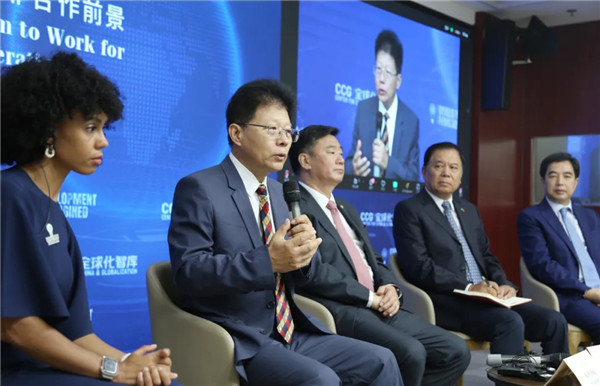
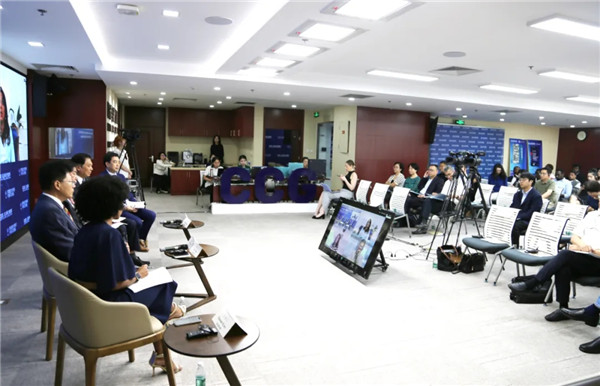
During the Q&A session, journalists from CCTV, China.com, 21st Century Business Herald, Caixin, Nanfang Media Group and other media actively asked questions to the guests. Mr. Sena Voncujovi, Africa-China Policy Analyst at Development Reimagined, moderated the session.
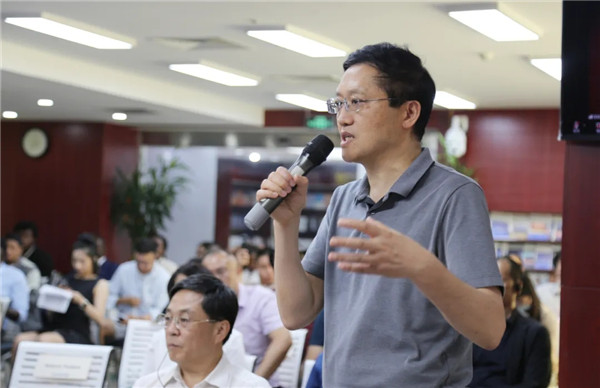
Mr. MIN Hao, CCG Senior Council Member and Founder and Chairman of SECURAM Systems Inc., shared his insights on China-Africa industrial standardisation cooperation from a business perspective. He emphasised that in the process of industrial development, standards must be prioritised; otherwise, it could lead to a massive waste of social resources, which would be long-term. China has a wealth of experience to share with African countries in this regard. Currently, the African Organisation for Standardisation (ARSO) has formulated fewer than 3,000 standards, while China has over 44,500 standards, and the International Organisation for Standardisation (ISO) has over 22,000 standards. This indicates a significant gap in Africa’s standard-setting. In the future, China and Africa could establish a permanent committee or hold China-Africa standardisation forums to enhance cooperation in this field.
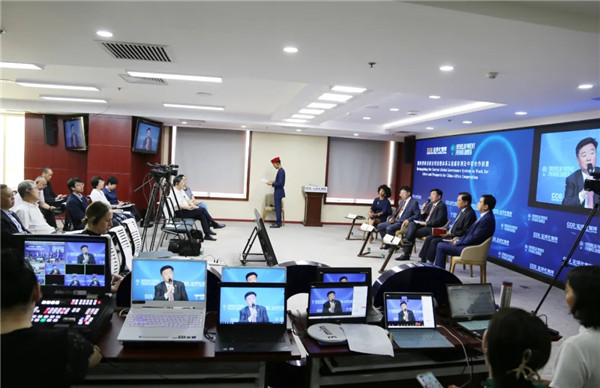
Faten Aggad, Executive Director of African Future Policies Hub and Former Senior Advisor to the African Union High Representative, Emmanuel Mutisya, Chairman of Kenya Advanced Institute of Science and Technology (Kenya-AIST), GOU Haodong, Former Deputy Representative of the Chinese Mission to the African Union and CCG Senior Research Fellow, HAN Bing, Former Minister Commercial Counselor in the Embassy of Egypt and Former Economic and Commercial Counselor in the Embassies of Zimbabwe, and MA Jianchun, Former Director-General of the Department of Foreign Affairs, the Ministry of Commerce and Former Ambassador to the Chinese Embassy in Gambia, shared their views on topics such as the AU’s expectations of the upcoming China-Africa Forum, how the two sides can promote China-Africa humanistic exchanges, the views of African countries on China’s electric vehicles, and China’s opportunities and challenges in infrastructure and green transformation.
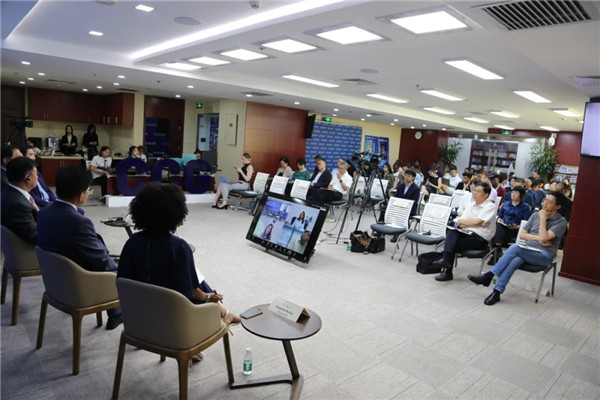
Other guests attending the meeting included ZHAO Hongsheng, Director of the Committee for Hong Kong, Macao, Taiwan, Overseas Chinese and Foreign Affairs of the CPPCC Beijing Municipal Committee, FU Yu, Deputy Director of the Proposals Committee of the Beijing Municipal Committee of the Chinese People’s Political Consultative Conference, YU Haiyong, Deputy Director of the Foreign Affairs Office of the People’s Government of Beijing Municipal, LI Jincheng, Director of Civil Exchange Coordination Department, Foreign Affairs Office of the People’s Government of Beijing Municipal, ZHUANG Wenjing, Member of the Central Committee of the Taiwan Union, Secretary General of the Beijing Municipal Committee of the Taiwan Union and Chairman of the Xicheng District Committee of the Taiwan Union, HU Peng, Researcher and Doctoral Tutor, Institute of Japanese Studies, Chinese Academy of Social Sciences , CAO Hui, member of the Beijing Municipal Committee of the Taiwan Alliance, director of the Beijing Federation of Taiwan Unions, and senior deputy manager of the Party Building Work Department of China Galaxy Securities Co., LYU Zhibin, Chairman of Overseas Chinese Federation of Beijing Dongcheng District and Level 3 Manager of ICBC Beijing Chongwen Sub-branch, LIU Wenchao, member of the Beijing Returned Overseas Chinese Federation and co-founder of Beijing TJD Parking Information Technology Co. and Director of Beijing Haian Parking Management Co., LIU Bo, Director of the Art Research Centre of the China Academy of Art, National First-Class Artist, Doctoral Supervisor, ZHAI Yuhang, Second Grade Researcher, Office of the Committee for Hong Kong, Macao, Taiwan, Overseas Chinese and Foreign Affairs of the CPPCC Beijing Municipal Committee, HAN Xu, principal staff member, Office of the Committee for Hong Kong, Macao, Taiwan, Overseas Chinese and Foreign Affairs of the CPPCC Beijing Municipal Committee, ZHANG Bin, third-level researcher of Civil Exchange Coordination Department, Foreign Affairs Office of the People’s Government of Beijing Municipal and dozens of other members of the Beijing Municipal Council, CHENG Lin, Director of International Cooperation and Research Centre of Institute of Finance and Sustainability, Pelumi Fadare, Consultant of Asian Infrastructure Investment Bank (AIIB), Benard Chitunga, Partnership Officer of Special Funds of Operational Partnership Department, Asian Infrastructure Investment Bank (AIIB), and more than 20 students from Peking University, China University of Petroleum, Beijing Foreign Studies University, China Foreign Affairs University, China Agricultural University, University of International Business and Economics, and Beijing Language and Culture University.
The meeting came to an end in a friendly and frank exchange atmosphere.
